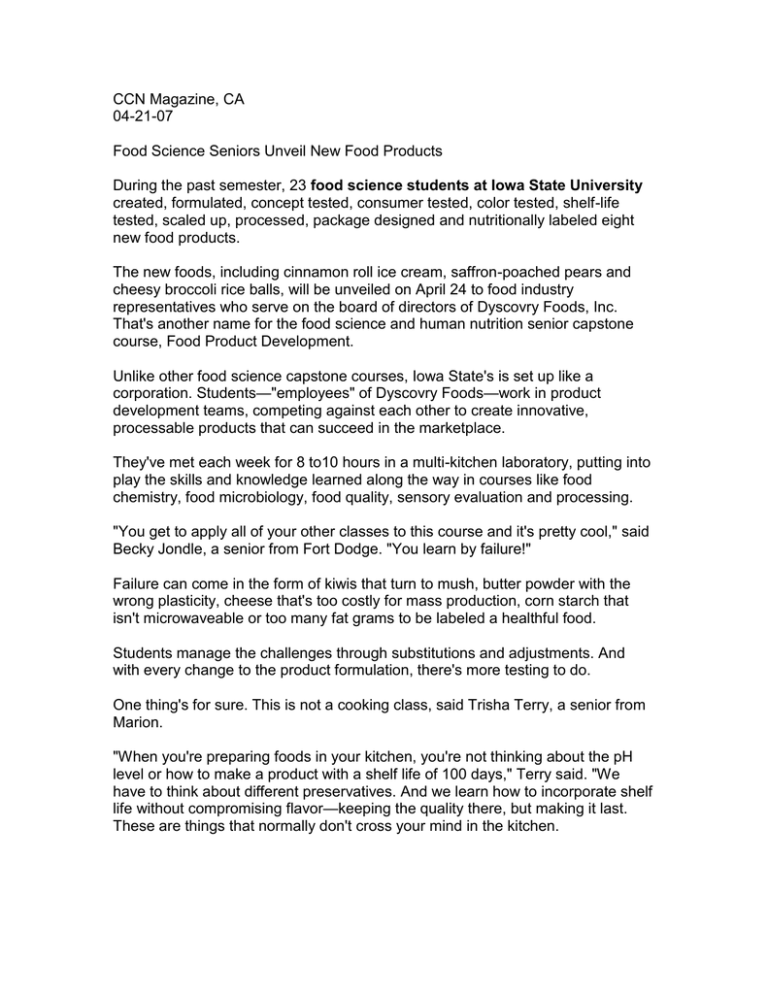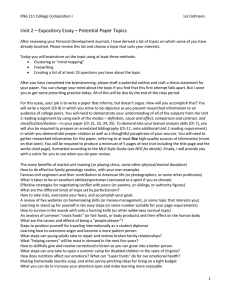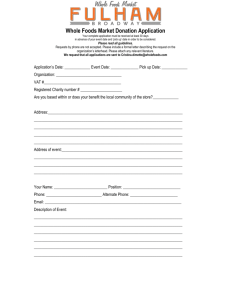CCN Magazine, CA 04-21-07 Food Science Seniors Unveil New Food Products
advertisement

CCN Magazine, CA 04-21-07 Food Science Seniors Unveil New Food Products During the past semester, 23 food science students at Iowa State University created, formulated, concept tested, consumer tested, color tested, shelf-life tested, scaled up, processed, package designed and nutritionally labeled eight new food products. The new foods, including cinnamon roll ice cream, saffron-poached pears and cheesy broccoli rice balls, will be unveiled on April 24 to food industry representatives who serve on the board of directors of Dyscovry Foods, Inc. That's another name for the food science and human nutrition senior capstone course, Food Product Development. Unlike other food science capstone courses, Iowa State's is set up like a corporation. Students—"employees" of Dyscovry Foods—work in product development teams, competing against each other to create innovative, processable products that can succeed in the marketplace. They've met each week for 8 to10 hours in a multi-kitchen laboratory, putting into play the skills and knowledge learned along the way in courses like food chemistry, food microbiology, food quality, sensory evaluation and processing. "You get to apply all of your other classes to this course and it's pretty cool," said Becky Jondle, a senior from Fort Dodge. "You learn by failure!" Failure can come in the form of kiwis that turn to mush, butter powder with the wrong plasticity, cheese that's too costly for mass production, corn starch that isn't microwaveable or too many fat grams to be labeled a healthful food. Students manage the challenges through substitutions and adjustments. And with every change to the product formulation, there's more testing to do. One thing's for sure. This is not a cooking class, said Trisha Terry, a senior from Marion. "When you're preparing foods in your kitchen, you're not thinking about the pH level or how to make a product with a shelf life of 100 days," Terry said. "We have to think about different preservatives. And we learn how to incorporate shelf life without compromising flavor—keeping the quality there, but making it last. These are things that normally don't cross your mind in the kitchen. "I'm definitely learning a lot about all the little things you might not think about while moving a product from the beginning idea stage all the way through commercialization," she said. In addition to the ice cream, rice balls and gourmet dessert pears, the student teams created: berry-apple-kiwi fruit salsa with cinnamon crisps; five-cheese, broccoli and wild rice soup; a soy-based, strawberry-filled cream puff; fortified, whole-wheat pita chips with hummus dip; and an Indian-spiced, breaded, chicken appetizer with cucumber-yogurt sauce. The class is team taught by food science and human nutrition faculty who function like corporate department managers: Ken Prusa (product development), Deland Myers (processing), Lester Wilson (quality control), and Mark Love (regulatory affairs.) All of the students' product concepts were approved initially by the Dyscovry Foods board. Representatives from Wells Blue Bunny, Marzetti Frozen Pasta, Hy-Vee Foods, Tone's, Grain Processing Corp. and other companies also provided guidance throughout the semester on flavor challenges, distribution issues and marketing questions. "We help students take a realistic look at the marketplace to make sure their product isn't a 'me too' product, but something unique that fits an unfilled need in the market," said Robin Kline, a food and nutrition consultant with Savvy Food Communications, Des Moines. And in the past, product concepts developed in Dyscovry Foods have landed on grocery store shelves, Prusa said. "I'm always amazed at the students' creativity. We challenge them to do something that's not out there and they do it every year," he said. "A few years ago, we had a group working on a raspberry vinaigrette spray salad dressing," Prusa said. "We thought this was a really cool idea. You could just spritz it on and control the calories. Our students called it Raspray. Just recently a product like this came on the market." And Hy-Vee Foods is interested in developing another product from this class, called Short-cut shortcake. Kline said because the class gives students experience in building life skills, it's important to the food industry. "They learn thinking on their feet, answering questions and challenges from management, dealing with disappointment and re-grouping when a project doesn't work," Kline said. "Students who get this challenge and experience are better equipped to face real business problems. Bottom line, this class gives students an edge."






